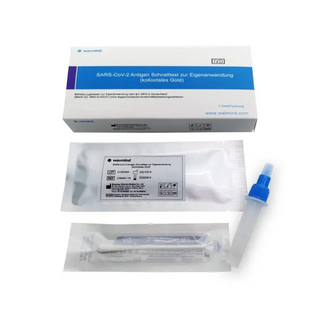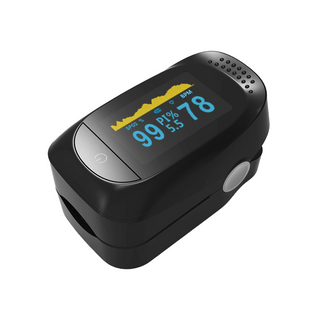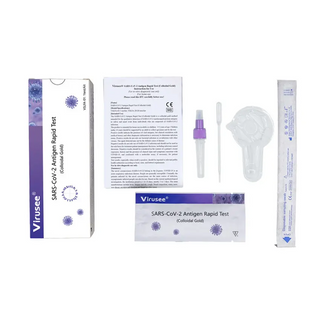Highly Sensitive Rapid Test for COVID-19 Antigens
- Unit price
- /per
Manufacturer: WATMIND, approved and available on the list of the European Union and the Ministry of Health.
- Rapid test for coronavirus antigen in nasopharyngeal and oropharyngeal secretions;
- Each package contains everything needed to perform the tests;
- Each test has a separate diluent;
- Quality certificates and CE mark available.
Contents:
- Test cassette
- Sterilized nasopharyngeal/oropharyngeal swab
- Test tube
- Cap
- Buffer Ampoule
- Instructions for use in Bulgarian
There is a separate diluent for each test.
Adding product to your cart
Principle
The Coronavirus (SARS-Cov-2) Antigen Test (Swab) is an immunochromatographic membrane assay that uses highly sensitive monoclonal antibodies to coronavirus.
The test consists of the following three parts, namely – sample pad, reagent pad and reaction membrane. The entire strip is fixed in a plastic device. The reaction membrane contains colloidal gold and embedded monoclonal antibodies against coronavirus, the reaction membrane contains the secondary antibodies to coronavirus and polyclonal antibodies against mouse globulin, which are pre-embedded on the membrane.
When the sample is added to the test window, the conjugates contained in the reagent pad dissolve and combine with the sample.
If coronavirus is present in the sample, the complex that is formed between the anti-coronavirus conjugate will be captured by the specific anti-coronavirus monoclonal agent, indicated by a T in the test cassette.
Regardless of whether the sample contains the virus or not, it continues to move towards another reagent (anti-mouse IgG antibody), thereby binding the remaining conjugates, exhibiting a red line in region C.
The Novel Antigen Rapid Test is an in vitro diagnostic test for the qualitative detection of novel antigens in nasal swab and nasal aspirate specimens using a rapid immunochromatographic method. Identification is based on monoclonal antibodies specific for the novel antigen.
Note: As with all diagnostic tests, a definitive clinical diagnosis should not be based on the result of a single test, but should be made by a physician only after all clinical and laboratory results have been evaluated.


